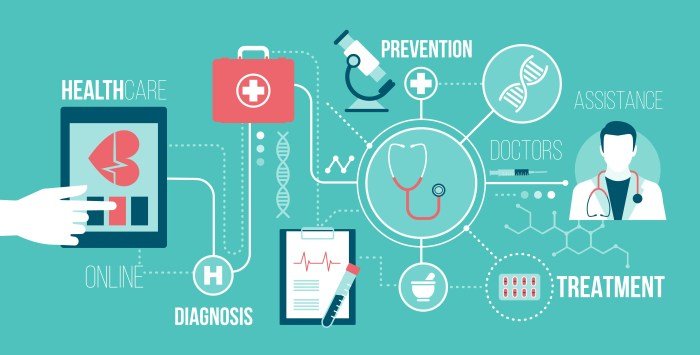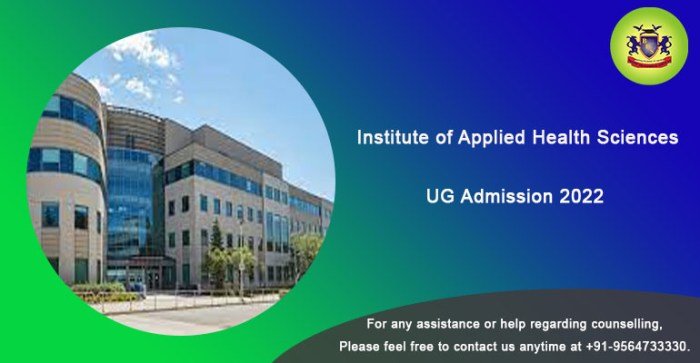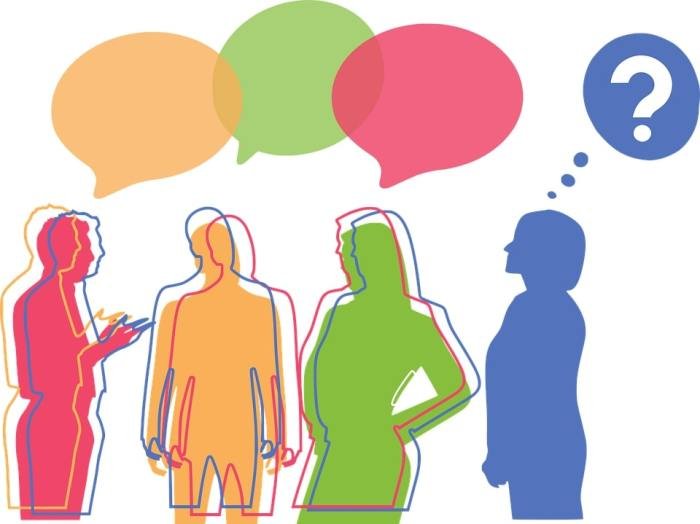Applied health sciences delve into the practical applications of scientific knowledge to improve health outcomes. This interdisciplinary field encompasses various disciplines, including medicine, public health, technology, and social sciences, working together to address complex health challenges.
From developing innovative treatments and preventive measures to promoting healthy lifestyles and managing chronic diseases, applied health sciences play a vital role in shaping the future of healthcare. The field is constantly evolving, driven by technological advancements, data analytics, and a growing understanding of human health.
Definition and Scope of Applied Health Sciences

Applied health sciences encompass a diverse range of disciplines that utilize scientific knowledge and principles to address real-world health issues. These disciplines focus on the practical application of scientific knowledge to improve health outcomes, prevent disease, and enhance well-being.
Interdisciplinary Nature of Applied Health Sciences
Applied health sciences are inherently interdisciplinary, drawing upon knowledge and methods from various fields, including biology, medicine, public health, psychology, engineering, and social sciences. This interdisciplinary approach allows for a comprehensive understanding of health problems and the development of innovative solutions.
Examples of Fields in Applied Health Sciences
The interdisciplinary nature of applied health sciences is reflected in the diverse range of fields that fall under its umbrella. These fields include:
- Biomedical Engineering:This field combines engineering principles with biological knowledge to develop medical devices, prosthetics, and other technologies to improve health care.
- Health Informatics:This field focuses on the management and analysis of health data to improve decision-making, enhance patient care, and support public health initiatives.
- Health Education:This field aims to promote healthy behaviors and improve health outcomes through education and communication strategies.
- Public Health:This field focuses on preventing disease and promoting health within populations through interventions that address environmental, social, and behavioral factors.
- Occupational Therapy:This field helps individuals with disabilities or injuries participate in meaningful activities and improve their overall well-being.
- Physical Therapy:This field focuses on restoring mobility and function, preventing injury, and managing pain through exercise and other physical interventions.
- Rehabilitation Sciences:This field encompasses a range of disciplines that address the needs of individuals with disabilities or chronic conditions, including physical therapy, occupational therapy, speech-language pathology, and psychology.
- Nutrition Sciences:This field focuses on the role of food and nutrients in promoting health and preventing disease.
- Health Policy and Management:This field focuses on the development and implementation of health policies and the management of health care systems.
Key Areas of Applied Health Sciences

Applied health sciences encompass a broad range of disciplines that focus on improving human health and well-being. These areas are interconnected and often rely on advancements in technology, data analytics, and public health interventions to achieve their goals.
Applied health sciences encompass a broad range of disciplines that focus on improving human health and well-being. This field often intersects with the realm of beauty, as seen in the rise of the beauty america movement, which emphasizes the connection between inner health and outer appearance.
By understanding the principles of applied health sciences, individuals can make informed choices that contribute to both their physical and aesthetic well-being.
The Role of Technology in Applied Health Sciences
Technology has revolutionized the field of applied health sciences, enabling advancements in diagnosis, treatment, and health management. Here are some key areas where technology plays a significant role:
- Telehealth and Telemedicine:Technology facilitates remote healthcare delivery, allowing patients to access medical services from their homes. This includes video consultations, remote monitoring of vital signs, and virtual therapy sessions. Telehealth expands access to healthcare, particularly in underserved areas.
- Medical Devices and Imaging:Advancements in medical devices, such as pacemakers, insulin pumps, and prosthetic limbs, have improved the quality of life for individuals with chronic conditions. Imaging technologies, like MRI and CT scans, provide detailed insights into the human body, aiding in diagnosis and treatment planning.
Applied health sciences encompass a wide range of disciplines, from nutrition and exercise physiology to public health and rehabilitation. One crucial aspect of promoting healthy living is ensuring access to fitness facilities, and the concept of 24 fitness hours addresses this need by providing round-the-clock access to exercise equipment and facilities.
This allows individuals to tailor their fitness routines to their busy schedules, ultimately contributing to the overall well-being and health of the population.
- Artificial Intelligence (AI):AI algorithms are being applied to analyze large datasets in healthcare, identifying patterns and predicting health outcomes. This enables personalized medicine, early disease detection, and more efficient drug discovery.
- Wearable Technology:Smartwatches, fitness trackers, and other wearable devices collect data on physical activity, sleep patterns, and vital signs. This information can be used to monitor health, promote healthy habits, and provide personalized health recommendations.
Data Analytics in Health Research
Data analytics plays a crucial role in understanding health trends, identifying risk factors, and developing effective interventions.
- Epidemiological Research:Data analytics helps researchers analyze large datasets to identify patterns and trends in disease occurrence, distribution, and risk factors. This information is essential for developing public health strategies and interventions.
- Clinical Trials:Data analytics is used to design, analyze, and interpret clinical trials, which evaluate the effectiveness and safety of new drugs, treatments, and medical devices.
- Personalized Medicine:Data analytics enables the development of personalized medicine approaches, where treatments are tailored to individual patients based on their genetic makeup, lifestyle, and other factors.
Public Health Interventions in Applied Health Sciences
Public health interventions aim to prevent disease, promote health, and improve the overall well-being of populations.
- Vaccination Programs:Vaccination programs are a cornerstone of public health, preventing the spread of infectious diseases and saving lives. Data analytics plays a crucial role in monitoring vaccine coverage and identifying areas where vaccination rates are low.
- Health Education and Promotion:Public health interventions often involve educating the public about health risks, promoting healthy behaviors, and providing access to resources that support healthy lifestyles.
- Environmental Health Interventions:These interventions focus on addressing environmental factors that contribute to disease, such as air and water pollution, and promoting healthy living conditions.
Health Education and Promotion in Applied Health Sciences
Health education and promotion play a critical role in empowering individuals to make informed decisions about their health and well-being.
- Disease Prevention:Health education programs provide information about risk factors for specific diseases and promote behaviors that reduce the risk of developing those conditions. For example, education about the risks of smoking and the benefits of quitting can significantly reduce the incidence of lung cancer.
- Health Management:Health education empowers individuals to manage chronic conditions effectively, adhere to treatment plans, and make healthy lifestyle choices. This includes providing information about medication, diet, exercise, and stress management techniques.
- Health Policy Advocacy:Health educators advocate for policies that promote health and well-being, such as policies that encourage physical activity, healthy eating, and access to healthcare.
Research and Development in Applied Health Sciences

Research and development (R&D) in applied health sciences play a crucial role in advancing our understanding of health, disease, and well-being. This area of research encompasses a wide range of disciplines, including medicine, public health, biomedical engineering, and nutrition, among others.
R&D efforts aim to develop new technologies, treatments, interventions, and strategies to address pressing health challenges and improve the quality of life for individuals and communities.
Ethical Considerations in Applied Health Sciences Research
Ethical considerations are paramount in applied health sciences research, ensuring that studies are conducted responsibly and ethically. This involves adhering to principles that safeguard the welfare and rights of research participants.
- Informed Consent:Participants must be fully informed about the nature, risks, and benefits of the research before consenting to participate. This ensures that they make voluntary and informed decisions about their involvement.
- Confidentiality and Privacy:The confidentiality and privacy of participants’ data must be protected. This includes securing personal information and ensuring that data is only used for the intended research purposes.
- Beneficence and Non-maleficence:Research should aim to benefit participants and society while minimizing potential harm. This principle guides the design and implementation of studies, ensuring that the potential benefits outweigh the risks.
- Justice and Equity:Research should be conducted in a way that is fair and equitable, ensuring that all individuals have equal access to the benefits of research and are not disproportionately burdened by its risks.
Applications of Applied Health Sciences in Practice

Applied health sciences play a pivotal role in shaping the healthcare landscape, impacting the delivery of care, promoting disease prevention and management, and ultimately enhancing health outcomes. This section delves into the practical applications of applied health sciences, showcasing their significant contributions to improving health and well-being.
Impact on Healthcare Delivery
The integration of applied health sciences has revolutionized healthcare delivery, leading to more efficient, effective, and patient-centered approaches. Applied health sciences provide a framework for understanding and addressing complex health issues, enabling healthcare professionals to make informed decisions and deliver optimal care.
- Technology-Enabled Care:Applied health sciences have paved the way for the development and implementation of innovative technologies, such as telemedicine, wearable health trackers, and electronic health records (EHRs). These advancements have improved access to healthcare, enhanced patient engagement, and facilitated better communication between healthcare providers and patients.
- Data-Driven Decision-Making:The ability to collect, analyze, and interpret vast amounts of health data is a cornerstone of applied health sciences. This data-driven approach empowers healthcare professionals to make evidence-based decisions, personalize treatment plans, and monitor patient progress effectively.
- Improved Efficiency and Cost-Effectiveness:By optimizing healthcare processes and resource allocation, applied health sciences contribute to increased efficiency and cost-effectiveness in healthcare delivery. This includes streamlining administrative tasks, reducing unnecessary procedures, and promoting preventive care measures.
Contributions to Disease Prevention and Management
Applied health sciences play a crucial role in promoting disease prevention and improving disease management strategies. By understanding the underlying mechanisms of disease and the factors influencing health outcomes, applied health sciences provide the tools and knowledge to develop effective interventions.
- Public Health Initiatives:Applied health sciences underpin public health initiatives aimed at preventing the spread of infectious diseases, promoting healthy lifestyles, and reducing risk factors for chronic conditions. Examples include vaccination programs, public health campaigns to promote healthy eating and physical activity, and interventions to address environmental health hazards.
- Personalized Medicine:The application of genomics, proteomics, and other “omics” technologies enables the development of personalized medicine approaches. These approaches tailor treatment plans to individual patients based on their unique genetic makeup and other biological factors, leading to more effective and targeted therapies.
- Disease Management Programs:Applied health sciences are essential for developing and implementing disease management programs for chronic conditions, such as diabetes, heart disease, and asthma. These programs provide patients with education, support, and ongoing monitoring to manage their conditions effectively and improve their quality of life.
Improved Health Outcomes
The practical applications of applied health sciences have resulted in demonstrable improvements in health outcomes, leading to longer lifespans, reduced morbidity, and enhanced overall well-being.
- Reduced Mortality Rates:Advancements in medical technology, disease prevention strategies, and treatment protocols have contributed to significant reductions in mortality rates from various diseases, including infectious diseases, cardiovascular diseases, and cancer.
- Improved Quality of Life:Applied health sciences have led to the development of interventions that improve the quality of life for individuals living with chronic conditions. These interventions include pain management strategies, assistive devices, and rehabilitation programs.
- Enhanced Health Equity:Applied health sciences strive to promote health equity by addressing disparities in access to healthcare and health outcomes. This includes developing culturally sensitive interventions, promoting health literacy, and addressing social determinants of health.
Future Directions in Applied Health Sciences

The field of applied health sciences is constantly evolving, driven by technological advancements, changing healthcare needs, and a growing understanding of human biology. This dynamic landscape presents exciting opportunities to improve healthcare delivery and outcomes.
Artificial Intelligence in Healthcare
Artificial intelligence (AI) is poised to revolutionize healthcare by augmenting human capabilities and enabling new possibilities. AI algorithms can analyze vast amounts of data, identify patterns, and make predictions, leading to more accurate diagnoses, personalized treatment plans, and efficient healthcare operations.
Applied health sciences encompass a wide range of disciplines that focus on practical applications of scientific knowledge to improve health outcomes. A key resource in this field is the health science authority , which provides evidence-based information and guidance on various health topics.
By utilizing this authority’s expertise, applied health sciences professionals can make informed decisions and develop effective interventions to address health challenges in communities.
- AI-powered diagnostics:AI algorithms can analyze medical images, such as X-rays, MRIs, and CT scans, to detect abnormalities that might be missed by human eyes. For instance, AI systems have been developed to detect breast cancer in mammograms with higher accuracy than radiologists.
- Personalized medicine:AI can help tailor treatment plans to individual patients based on their genetic makeup, lifestyle, and medical history. For example, AI algorithms can predict which cancer drugs are most likely to be effective for a particular patient, reducing the trial-and-error process and improving treatment outcomes.
- Drug discovery and development:AI can accelerate the process of drug discovery and development by identifying potential drug targets, designing new molecules, and predicting drug efficacy. This can lead to faster development of new therapies for diseases that currently lack effective treatments.
- Healthcare administration:AI can streamline administrative tasks, such as scheduling appointments, managing patient records, and billing. This frees up healthcare professionals to focus on patient care and improves overall efficiency.
Emerging Technologies
The rapid advancement of technology is creating new tools and approaches that are transforming applied health sciences. Here are some of the most promising emerging technologies:
- Genomics and gene editing:Advances in genomics and gene editing technologies are opening up new possibilities for treating and preventing diseases. For example, gene therapy can be used to replace faulty genes with healthy ones, potentially curing genetic disorders. CRISPR-Cas9, a powerful gene editing tool, allows scientists to precisely modify DNA sequences, opening up possibilities for treating a wide range of diseases.
- Wearable sensors and Internet of Things (IoT):Wearable sensors and IoT devices can continuously monitor patients’ vital signs, physical activity, and other health indicators, providing real-time data to healthcare providers. This can enable early detection of health problems and improve disease management.
- Virtual reality (VR) and augmented reality (AR):VR and AR technologies are being used to create immersive training simulations for healthcare professionals, improve patient education and rehabilitation, and enhance pain management.
- 3D printing:3D printing is revolutionizing healthcare by enabling the creation of personalized medical devices, such as prosthetics, implants, and surgical guides. It also allows for the production of custom-made medications and drug delivery systems.
Personalized Medicine, Applied health sciences
Personalized medicine is an approach to healthcare that tailors treatment plans to individual patients based on their unique genetic, environmental, and lifestyle factors. This approach aims to improve treatment outcomes, reduce side effects, and prevent disease.
- Genetic testing:Genetic testing can identify specific genes that increase a patient’s risk for certain diseases, allowing for early intervention and personalized prevention strategies. For example, genetic testing can identify individuals at risk for breast cancer, allowing for more frequent screenings or prophylactic measures.
- Pharmacogenomics:Pharmacogenomics studies how genetic variations affect drug response. This information can be used to predict which drugs are most likely to be effective for a particular patient and minimize the risk of adverse drug reactions.
- Lifestyle interventions:Personalized medicine emphasizes lifestyle interventions tailored to individual needs and preferences. This can include personalized diet and exercise recommendations, stress management techniques, and other lifestyle modifications that promote health and well-being.
Last Point

Applied health sciences are at the forefront of transforming healthcare, empowering individuals and communities to live healthier lives. By embracing innovation, fostering collaboration, and prioritizing ethical considerations, this dynamic field holds immense potential to address global health challenges and create a healthier future for all.
Answers to Common Questions
What are some specific examples of applied health sciences in action?
Examples include using telemedicine to provide remote healthcare services, developing mobile health apps to track fitness and health data, implementing public health campaigns to promote healthy behaviors, and utilizing data analytics to identify disease trends and target interventions.
How does applied health sciences differ from traditional medical research?
While traditional medical research focuses on fundamental scientific discoveries, applied health sciences translate these discoveries into practical applications that directly benefit individuals and communities. It emphasizes the real-world implementation of knowledge to improve health outcomes.
What are the career opportunities in applied health sciences?
Career opportunities are diverse and span various sectors, including healthcare, research, public health, technology, and education. Some roles include health informaticists, public health professionals, health educators, research scientists, and biostatisticians.